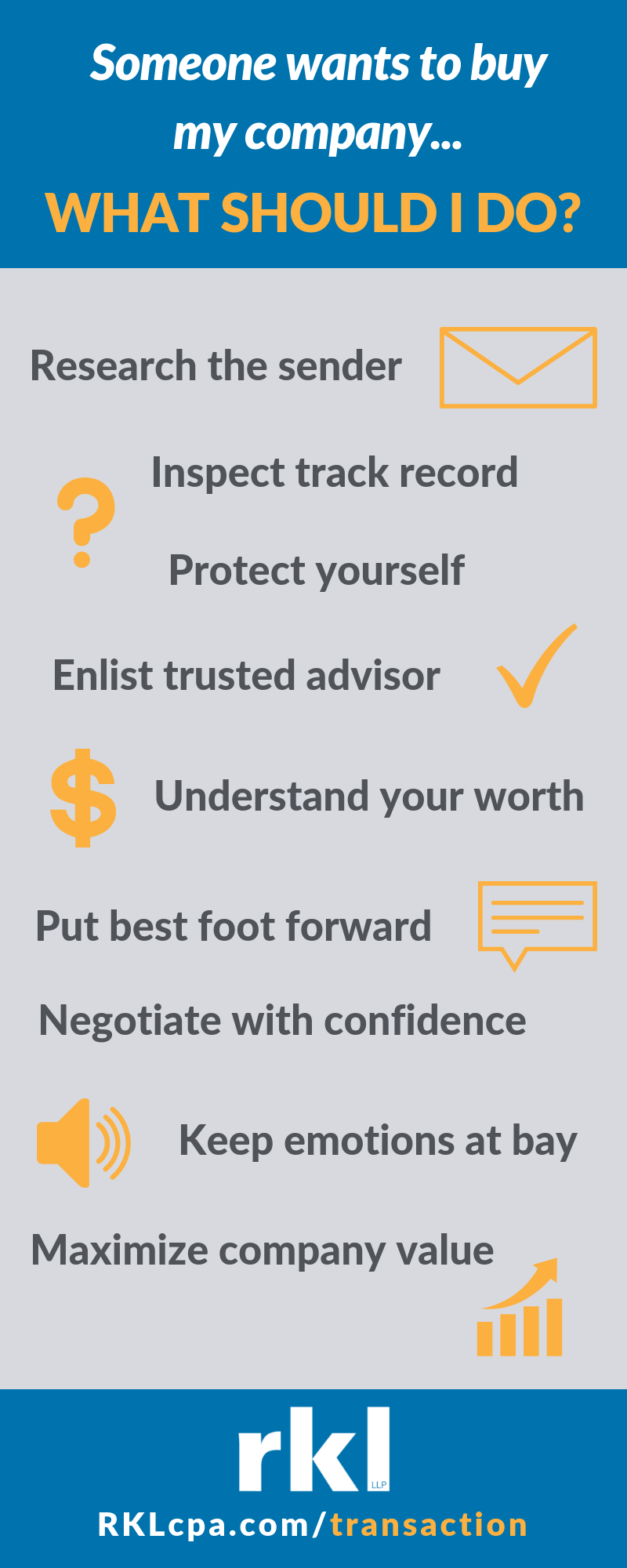In today’s active mergers and acquisitions climate, businesses in high growth mode or investors seeking to add more companies to their portfolios routinely pursue new acquisition targets. One example of this outreach is an unsolicited offer. Whether it takes the form of a letter or a phone call, business owners should not dismiss these offers out of hand. Instead, this can be a valuable opportunity to consider options and lay the groundwork for a future transaction.
Since the offer was not sought out by the business owners, it is important to conduct the necessary due diligence and proceed with care through any resulting interaction. RKL’s team of transaction advisors have helped many owners evaluate and engage in conversation around unsolicited offers. Here are some tried and true steps to protect your company’s proprietary information and reputation while obtaining important feedback on its overall viability as an acquisition target.
Download an infographic version of the steps here…
 Research the sender
Research the sender
With spam calls, letters and emails filling our inboxes, it is important to make sure any outreach is legitimate before responding. Do you know who the sender is? Is it a company or an agent? A good indicator to start is the tone and format of the letter or voicemail. Does it sound credible? Is it written with care and communicated with genuine interest? Does it contain enough detail to show that they did some homework on your business?
Inspect acquirer’s track record
What is the buyer willing and able to pay? It is important to get a sense early on if they are an experienced acquirer who knows what they want and can move swiftly, rather than dragging you along for their ride up the learning curve. It’s also beneficial early on to understand their preferred structuring and approach to pricing and make sure that this aligns with your objectives.
Protect yourself
Even if you have no interest in selling right now, a conversation around the offer can be beneficial to get feedback and lay the groundwork to accelerate the process for a future transaction. Insist on a nondisclosure agreement (NDA) composed with the help of legal counsel that covers not only information shared and with whom it is shared, but also the fact you are engaging in this type of discussion. Keep in mind that you are in control of the information flow and are under no obligation to share anything that gives you pause or causes discomfort.
Enlist a trusted advisor to help navigate the process
Before getting too far down the discussion path, enlist an experienced transaction advisor who specializes in acquisitions. He or she can guide you through what is normal, provide expertise, lend a helping hand as you continue working in your business and play “bad cop” as needed.
Understand your worth
Try to understand the interested party’s intentions and where they see value in your business. This perceived value may not be reflected in your historical financial performance and may stem from another aspect of your business (geographic market, customer base, etc.). A brief chat around their perceptions may result in valuable and actionable insights. It’s also helpful to have an understanding of the value of your business and the state of the M&A market in advance of engaging in discussions.
Put your best foot forward
Building upon the prior point, do not turn over just your financial statements or tax returns. Take stock of the entire operation and compose a portfolio of information that properly depicts your business’ story and aligns with the value proposition to the prospective buyer. Also remember that you can control the flow of information to maximize buyer interest but protect your proprietary information and relationships.
Negotiate with confidence
Remember that you did not solicit this offer, so you can easily withdraw from talks and go back to business as usual. This mindset gives owners the upper hand in negotiations. Proceed at a comfortable pace, but do not discount the importance of momentum in these negotiations.
Keep emotions at bay
Try not to get caught up in the emotional aspects, particularly an offer price. If the initial outreach includes a stated offer price, it is an intentional maneuver to tap into your emotions and get your wheels turning. With these out-of-the-blue prices, it is highly unlikely the interested party has much, if any, information to develop a credible offer.
Maximize your company value
Whether you decide to sell now or hold off, it is critical that you work on your business so it is positioned in the best possible light for sale and is easily transferable. This process can underscore weaknesses and strengths that you can address to improve the overall value.
“I’ve never done this before” is a common refrain from business owners who receive these types of offers. Keeping the above tips in mind can help you protect your company and gain valuable business intelligence. At the very least, it is an opportunity to practice for the moment you are ready to sell.
Do you need assistance researching an unsolicited offer or navigating a discussion with a potential buyer? Contact me to tap into RKL’s wide menu of transaction due diligence services.




